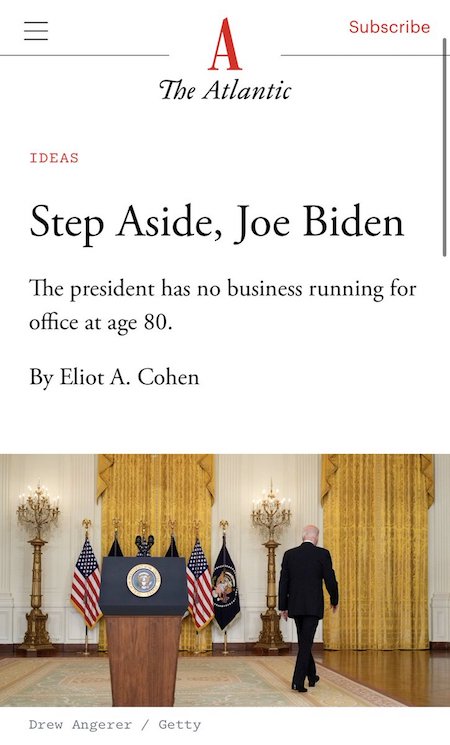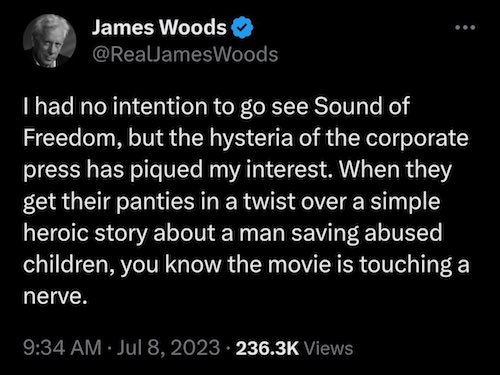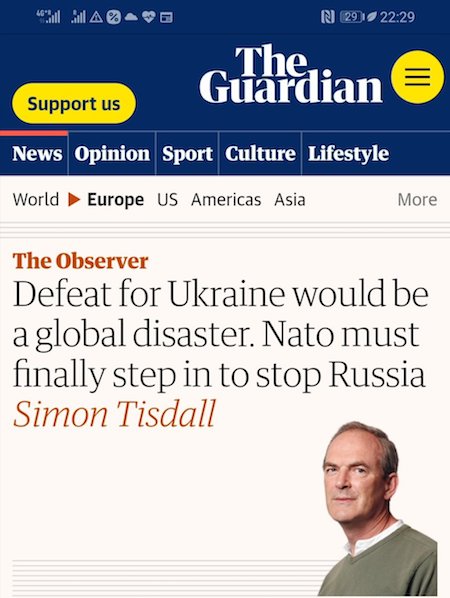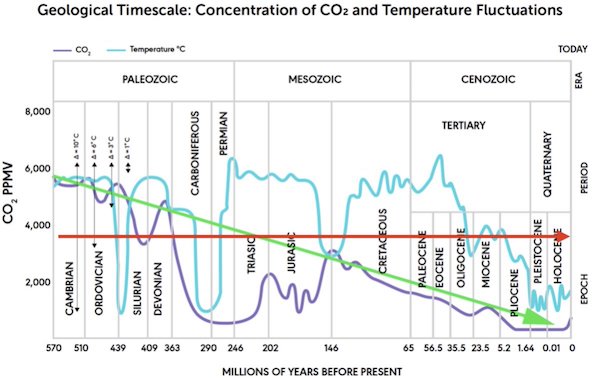
Carl Frederik Aagaard View to the Amalfi Coast c1860 (woodblock)



The film “Sound of Freedom” was written before anyone heard of qanon. And the real-life story it is based on is years older than that.
The movie has nothing to do with Q. CNN is smearing a powerful consciousness raising film. pic.twitter.com/maoqaqT8Mb
— James Hirsen (@thejimjams) July 9, 2023





Tucker Sund
https://twitter.com/i/status/1677426193744707586

Macgregor
BlackRock wants to control as much of Ukraine as it can..pic.twitter.com/JedRh4AWBk
— Douglas Macgregor (@DougAMacgregor) July 9, 2023


“We [US] wanted the war, for the reasons that Biden has said… The real reason for the war in Ukraine is regime change in Russia..”
• Biden Admin Lying ‘About Everything to Do With Ukraine’ – RFK Jr. (Sp.)
The federal government under the administration of Joe Biden has been blatantly lying to the Americans “about everything to do with Ukraine,” said Robert F. Kennedy Jr., in an interview for Judge Andrew Napolitano on his Judging Freedom podcast. “This was a sell job that they gave us on Ukraine,” insisted the 2024 Democratic candidate for US President. “The Russians tried to avoid a war… wanted to sign the Minsk Accords – a reasonable document – to keep NATO out of Ukraine, with Ukraine remaining neutral… That we [US] remove the Aegis missile systems from Romania, Poland, and that the murder…the wholesale killing of ethnic Russians in the Donbass by the Ukrainian government that America put in power stop. Those are all things that we should have agreed to,” stated the nephew of assassinated former US President John F. Kennedy.
He added that Ukraine’s President Volodymyr Zelensky won in 2019 by promising to sign the Minsk accords. The complex series of measures negotiated by Russia, France, Germany and Ukraine in 2014-2015 in a bid to put an end to the armed conflict between the Kiev authorities and the breakaway region of Donbas. Moscow repeatedly stated that Kiev was not fulfilling the deal, for example not granting self-government to the Russian-speaking region of Donbass. In February, Ukrainian President Volodymyr Zelensky admitted he never intended to implement the Minsk agreements, with former German Chancellor Angela Merkel and Former French President Francois Hollande, who participated in the Normandy format, admitting the same.
“It is existential for the Russians… they have a legitimate national security interest,” Robert F. Kennedy Jr. pointed out, referring to Moscow’s ongoing special military operation in Ukraine. “We [US] wanted the war, for the reasons that Biden has said… The real reason for the war in Ukraine is regime change in Russia,” RJK Jr. emphasized in the interview on the Judging Freedom podcast. Robert F. Kennedy Jr. previously slammed decades of policy conducted by the US and NATO toward Ukraine and Russia for fueling the current conflagration. “We have neglected many, many opportunities to settle this war peacefully,” Kennedy said in June during a live town hall event with NewsNation.
He added that Washington had turned the ongoing conflagration in Ukraine into a proxy war waged by the United States against Russia. “We were told this was a humanitarian exercise. … But when President Biden was asked why are we over there, he said for regime change of [Russian President] Vladimir Putin,” the 2024 White House hopeful underscored. Weighing in on remarks by US Defense Secretary Lloyd Austin, who said last year that Washington wanted “to see Russia weakened,” RJK Jr. scathingly remarked: “That is the opposite of a humanitarian mission, that is a mission about a war of attrition.”

“Trump is the only person with stature in the Republican Party really who is saying, ‘Wait a second, why are we supporting an endless… [conflict] in Ukraine?”
• Tucker Carlson Hopes Trump & RFK Jr. Win 2024 Nomination (Sp.)
Tucker Carlson hopes that Democratic candidate for US President Robert Kennedy Jr. and former POTUS Republican 2024 hopeful Donald Trump win their respective nominations. “Bobby Kennedy and Trump will both have a very tough time getting the nomination… I’m hoping that both of them will [win], of course,” Carlson said in an interview with English comedian and actor Russell Brand on Friday. “I’m hoping that their message will be heard… I don’t know. I don’t even know what I hope for in the process itself, but I want them to be heard. And they can now be heard. Because there are channels of information that people can tune into and listen,” the prominent reporter added. Carlson, who emphatically told the host that he “loves Trump,” dodged a question regarding the potential outcomes of the primaries, set to start early in 2024.
However, he insisted that in 10 years, “we’re going to see Trump’s emergence as the most significant thing to happen in American politics in 100 years because he reoriented the Republican Party against the wishes of Republican leaders.” Regarding Trump, the former anchor insisted that the Republican hopeful was right about the Ukraine crisis, saying: “Trump is the only person with stature in the Republican Party really who is saying, ‘Wait a second, why are we supporting an endless… [conflict] in Ukraine?” The journalist likened Donald Trump and RFK Jr. to Ross Perot and Teddy Roosevelt, respectively. “Teddy Roosevelt grew up rich. Of course, in New York, Trump, Bobby Kennedy is famous, [from] one of [the] most famous families in the world, in modern history, the Kennedys, and certainly the most famous family in Democratic politics,” he said.
“So these are people who know how the system works because they benefited from the system. And so their critique is much more meaningful and much more effective, I would say, because they can bear witness to what they have seen,” Carlson underscored. Trump, who is seeking an Oval Office comeback after losing the 2020 election to Biden, is a frontrunner in the Republican primary race that includes Florida Governor Ron DeSantis, and his former vice president, Mike Pence. Others in the GOP ballgame include former South Carolina Republican Gov. Nikki Haley, South Carolina Senator Tim Scott, and several “longshots” in the fray. As for the much narrower 2024 Democratic field, leading it is White House incumbent Joe Biden. At 80, he is the oldest sitting president in US history, and can hardly boast of an approval rating barely above 40%.
His rival for nomination is Robert F. Kennedy Jr., nephew to assassinated former US President John F. Kennedy. Incidentally, according to a YouGov survey, RFK Jr. boasts the highest favorability rating of all the current 2024 presidential candidates – 49 percent of respondents saw him favorably in June.

Same for a nuclear bomb?
• ‘Russian Victory’ Worse Than Civilian Cluster-bomb Deaths – Pentagon (RT)
US fears of Russian success on the battlefield outweigh concerns that deliveries of cluster bombs to Ukraine could result in civilian casualties, a senior Pentagon official acknowledged on Friday. Speaking to reporters, Under Secretary of Defense for Policy Colin Kahl defended the White House’s decision to approve another $800 million weapons package for Ukraine, including cluster munitions. The weapons are banned in more than 100 countries. When they detonate, the munitions release many small bomblets over a wide area. A percentage of bomblets fail to detonate on impact, however, and unexploded elements pose severe risks to civilians for years after fighting ends.
Asked if the Pentagon has assured its allies that the munitions will not cause excessive civilian harm, Kahl replied: “I’m as concerned about the humanitarian circumstance as anybody, but the worst thing for civilians in Ukraine is for Russia to win the war. And so it’s important that they don’t.” He added that Kiev had promised not to use cluster munitions in civilian-populated urban areas and to keep records of where the weapons are deployed to make future de-mining efforts easier. The official also portrayed the deliveries as a stop-gap measure until Kiev’s Western backers can ramp up production of conventional shells. In an interview with CNN’s Fareed Zakaria, US President Joe Biden described the decision to supply the controversial shells to Ukraine as “difficult.”
He said that it was in part motivated by the fact that both Kiev and Washington recognise a deficit in ordinary ammunition, adding that Ukraine “needed” cluster munitions to prevent Russia from stopping its ongoing counteroffensive. Commenting on the announcement, Anatoly Antonov, the Russian ambassador to the US, called the move “a gesture of desperation,” adding that the West does not want to admit that Ukraine’s counteroffensive is faltering. Russian Foreign Ministry spokeswoman Maria Zakharova reacted by posting a clip of former White House Press Secretary Jen Psaki from late February 2022, days after the start of the Ukraine conflict, saying that the use of cluster munitions could potentially be regarded as a war crime.


“..when employed in real-life situations, the “dud” rate of the sub-munitions will be much higher—often up to 20%..”
• Cluster Munitions Will Change Nothing for Ukraine (Scott Ritter)
The Biden administration has announced that it will be authorizing a new tranche of military support for Ukraine Totaling around $800 million, it will also feature Bradley and Stryker fighting vehicles, air defense missiles, and anti-mine equipment—and hundreds of thousands of 155mm artillery dual-purpose improved conventional munition (DPICM) rounds, the M864. The United States has, prior to the recent announcement, refused to provide cluster munitions to Ukraine for one simple reason—much of the world, including many of America’s NATO allies—views cluster munitions as representing an unacceptable risk to civilian life due to the high occurrence of “dud” munitions (i.e., munitions that fail to detonate on impact).
As a result, cluster munitions continue to kill long after the battle where they were employed has ended. The victims tend to be civilians who stumble upon these munitions and inadvertently set them off. While the US has refused to sign the Convention on Cluster Munitions (CCM), an international treaty that prohibits all use, transfer, production, and stockpiling of cluster munitions, it has recognized the need to develop cluster munitions with a designed “dud” rate of less than 1% to minimize the post-conflict risk to civilian populations. For this reason, the US military stopped using the M864 in 2016, replacing it with an improved DPICM round. While the M864 round does not meet the 1% “dud” threshold set by the US Dewhen employed in real-life situations, the “dud” rate of the sub-munitions will be much higher—often up to 20%partment of Defense for DPICM munitions, the Biden administration touts the fact that the M864 has a “dud” rate of less than 2%, which given the urgency of the need for artillery shells by Ukraine, is deemed to be an acceptable departure from the US norm.
However, like virtually every statement made by the United States regarding the conflict in Ukraine, the claim that the M864 DPICM rounds being sent to Ukraine are comprised only of batches “certified” as possessing a “dud” rate of less than 2% is a calculated lie. The tests cited—five of them, conducted between 1998 and 2020—were carried out at the KOFA firing range, located within the US Army’s Yuma Proving Ground, in Arizona, using the Terminal Ballistics Evaluation Area, which possesses a prepared and instrumented impact area optimized for data collection. This range employs a surface area consisting of hard-packed, flattened dirt designed to maximize point-detonating fuses such as those employed on the 24 M46 and 48 M42 dual-purpose anti-materiel/anti-personnel sub-munitions contained in each M864 round.
However,. Rough terrain, mud, soft soil, trees, and bushes all conspire to prevent the sub-munitions from detonating. Moreover, given that the lifespan of a 155mm artillery shell is 20 years, and that production of the M864 round, which began in 1987, terminated in 1996, the vast majority of the M864 artillery shells being provided to Ukraine have reached or exceeded their expiation date, which means that there is an increased probability that many of these shells will not perform as designed.

“Through the cluster munition deliveries, Washington de-facto becomes an accomplice in mining [Ukraine’s] territory and will share full responsibility for the deaths… of both Russian and Ukrainian children.”
• Supplying Cluster Bombs To Ukraine Is Wrong – Spain (RT)
Cluster munitions should not be used by Ukraine “under any circumstances,” Spanish Defense Minister Margarita Robles said on Saturday. One day earlier, the US announced that it would send the controversial ordnance to Ukraine amid a shortage in conventional shells. “Spain, based on the firm commitment it has with Ukraine, also has a firm commitment that certain weapons and bombs cannot be delivered under any circumstances,” Robles told reporters after a rally in Madrid. Spain says “no to cluster bombs and yes to the legitimate defense of Ukraine, which we understand should not be carried out with cluster bombs,” Robles added, according to Reuters.
The White House announced on Friday that President Joe Biden had authorized the delivery of an unspecified number of dual-purpose improved conventional munitions (DPICM) to Kiev, based on the “unanimous” recommendation of the president’s national security team. The shells, which can be fired from Ukraine’s NATO-supplied 155mm artillery, scatter many small ‘bomblets’ over a wide area, some of which fail to immediately explode and pose severe risks to civilians for years after fighting ends. Cluster munitions are banned by more than 120 countries, although the US, Ukraine, and Russia are not parties to the ban. Biden’s decision was also criticized by Germany and the UK. However, US National Security Adviser Jake Sullivan told reporters on Friday that sending these weapons was necessary to “bridge” the gap until Kiev’s Western backers could increase production of conventional 155mm shells.
Speaking to CNN later on Friday, Biden was more blunt. “It was a very difficult decision on my part,” he said, claiming that he signed off on the supply because “the Ukrainians are running out of ammunition.” Last year, then White House Press Secretary Jen Psaki described Russia’s alleged use of similar ordnance as “potentially a war crime.” Moscow was dismissive of the news. Cluster bombs are “yet another ‘Wunderwaffe’ [wonder weapon] Washington and Kiev are betting on, without thinking about the harsh consequences,” Russian Foreign Ministry spokeswoman Maria Zakharova said at a press briefing on Friday. “Through the cluster munition deliveries, Washington de-facto becomes an accomplice in mining [Ukraine’s] territory and will share full responsibility for the deaths… of both Russian and Ukrainian children.”

“Berlin doesn’t want to see [Russian President] Vladimir Putin potentially test Article 5.”
• Germany Set Against Ukraine’s Bid for NATO Membership (Sp.)
Germany plans to insist during the upcoming NATO summit in Lithuania that Ukraine should not be granted NATO membership, UK media reported on Saturday, citing an alliance source. The source said that Berlin plans to urge other NATO members during the Vilnius summit on July 11-12 that they should focus on security assurances to Kiev, and not NATO membership, in order not to risk a war with Russia. “Berlin is stand-offish at the prospect of offering immediate membership,” the source told The Telegraph, adding that Germany “wants a process and time to develop guarantees to essentially block membership,” since “Berlin doesn’t want to see [Russian President] Vladimir Putin potentially test Article 5.”
According to The Telegraph, the United States, the United Kingdom and the European Union are currently working on “Bucharest-plus” – a series of bilateral security offerings to Kiev – instead of offering Ukraine NATO membership. Individual offers of security guarantees to Kiev would then be combined into an umbrella deal, a “Memorandum of Understanding,” endorsed by NATO and the EU, the newspaper said, adding that, according to sources, it would be the “next best offer” to Kiev.

Germany says no, Macron turns around and says yes. Is this a game?
• France’s Macron Has Changed Mind About NATO – Bloomberg (RT)
By backing membership for Ukraine, the French president is trying to court Eastern European support, the newspaper’s sources said French President Emmanuel Macron © Nicolas Economou / Getty Images French President Emmanuel Macron realizes that Eastern European states are becoming more influential within NATO, and has shifted his rhetoric on the bloc to match them, Bloomberg reported on Saturday. Macron recently backed a “path” to NATO membership for Ukraine. Before the conflict in Ukraine began, Macron was regarded as one of Europe’s most NATO-skeptic leaders. He proclaimed the bloc “brain dead” in 2019, and spent his first term in office repeatedly calling for the establishment of a “true European army” independent from the US.
Even throughout the first year of the conflict, Macron stayed in phone contact with Russian President Vladimir Putin and distanced himself from “Anglo Saxon” leaders, whom he said seek to “annihilate” Russia. However, his rhetoric has since changed. In May, Macron called on NATO leaders to offer Kiev a “path” to full membership in the bloc, and declared that the EU and NATO should expand their military cooperation “as quickly as possible.” The shift was a calculated one, Bloomberg reported. Citing a diplomat from Eastern Europe, the newspaper explained that “positioning France alongside Ukraine’s fiercest supporters, Poland and the Baltic states, helps to fill the gap left by German Chancellor Olaf Scholz’s more cautious approach.”
A French diplomat framed Macron’s apparent conversion in more ideological terms, stating that the president “has understood he needs to be on the right side of history,” in Bloomberg’s words. In order to convince NATO’s eastern members, Macron will need to back his words with actions, the newspaper claimed. Although France was one of the first NATO members to provide Kiev with armored vehicles, France will likely need to up its spending on Ukraine to beyond its current level of 0.3% of GDP, Bloomberg suggested.
However, anonymous French officials told the newspaper that Macron’s government is already examining how its nuclear arsenal could “contribute to Ukraine’s security guarantees.” While offering to protect Ukraine with nuclear weapons would be a seriously escalatory step, some officials Bloomberg spoke to regarded Macron’s recent statement as “hot air.” With his attempts to dissuade Putin from sending troops to Ukraine failing last year and his offer to help China negotiate a peace deal languishing, one anonymous official explained that Macron is enthusiastically backing NATO expansion simply because everything else he has tried “hasn’t worked.”

This is about China.
• France Blocks NATO Plans For Japan (RT)
Paris has refused to approve a scheme to open a NATO liaison office in Japan, arguing the bloc should not extend itself beyond the North Atlantic, according to an Elysee Palace official cited by Politico. “NATO means North Atlantic Treaty Organization,” the official told journalists on Friday, warning against blurring the lines and emphasizing that even the notorious Article 5 of the bloc’s treaty specifically refers to maintaining the “security of the North Atlantic area.” “We are not in favor as a matter of principle,” the official added. “As far as the office is concerned, the Japanese authorities themselves have told us that they are not extremely attached to it.” French President Emmanuel Macron personally believes that the body’s charter imposes geographic limitations which bar NATO from expanding into Asia, according to a recent report by the Financial Times.
Back in May, Japanese Ambassador to the US Koji Tomita said that Japan was “working” towards opening a NATO liaison office in Tokyo, which would become the bloc’s first in Asia. The scheme has been discussed intermittently since 2007, when Japan’s then-Prime Minister Shinzo Abe first visited NATO’s headquarters, and was raised again in recent months. Tokyo has steadily increased its cooperation with the bloc over the years, opening its first NATO branch office in Brussels in 2018. Prime Minister Fumio Kishida became the first Japanese leader to attend a NATO summit last year. Japan, as well as Australia, New Zealand and South Korea, have also been invited to the 2023 summit that will take place in Vilnius, Lithuania on July 11 and 12, as the bloc shows increased interest in the Indo-Pacific in recent years.
China objected to NATO’s creeping expansion, claiming that the bloc should remain within its own sphere of influence and not seek to grow its presence in Asia, arguing the region “does not welcome bloc confrontation or military blocs.” Russia, which strongly opposes NATO’s expansion in Eastern Europe, also criticized the bloc’s attempts to extend its activities into Asia. In March, Russian President Vladimir Putin said the push by the US and its allies to create what he called a “global NATO” resembled the actions of Nazi Germany, Italy and Japan in the 1930s before the outbreak of World War II.
https://twitter.com/i/status/1676314362024263682

Putin trusted Erdogan.
• Turkish Release Of Ukrainian Neo-nazis A Deal ‘Violation’ – Kremlin (RT)
Allowing former commanders of the neo-Nazi Azov regiment to return to Ukraine is a “direct violation” of a 2022 prisoner swap deal between Moscow and Kiev that also involved Türkiye, Kremlin spokesman Dmitry Peskov said on Saturday. Earlier the same day, the five previously interned Azov commanders flew from Türkiye to Ukraine aboard President Vladimir Zelensky’s plane. The Ukrainian leader hailed the development as a “return of heroes” and published a video of the five men boarding his aircraft on Facebook. Zelensky had arrived in Türkiye on a short visit after an invitation by Turkish President Recep Tayyip Erdogan.
“Both the Ukrainian and Turkish sides breached the provisions [of the deal] in this case,” Peskov said, commenting on the developments. He also said that Moscow had not been duly informed of Ankara’s decision to hand over the five Ukrainians. Türkiye was apparently “forced” to take this step ahead of the upcoming NATO summit in Vilnius, the Kremlin spokesman said, adding that the Turkish leadership had to demonstrate “solidarity” with the military bloc and that Moscow was “well aware” of that. “Yet, a breach of an agreement flatters no one,” the official stressed. Ankara has so far not commented on the developments.
Under a major prisoner exchange agreement reached in September 2022, five commanders, including top Azov leaders, were to stay in Türkiye until the end of the ongoing conflict between Ukraine and Russia. At that time, Zelensky himself explicitly stated that Kiev had agreed to that condition. Erdogan then offered the five Ukrainians protection. All of them were captured by the Russian forces and Donbass militias in spring 2022 following the lengthy siege of the Azovstal steel plant in the Azov Sea port city of Mariupol.
Another step by Erdogan in support of Kyiv
The commanders of the national battalion "Azov" Denis Prokopenko, Svyatoslav Palamar, Sergey Volynsky, Oleg Khomenko, Denis Shlega are going to Ukraine from Turkey pic.twitter.com/hiCQ39bRfO
— Spriter Team (@SpriterTeam) July 8, 2023

“..a pool of reserve currencies, which should show itself – I think it will be after the summit in August..”
• BRICS Needs Qualitative Expansion, Says Russian Lawmaker (Sp.)
On Friday, Belarusian Ambassador to Brazil Sergey Lukashevich has passed a note to the Brazilian government conforming Minsk’s desire to become a full-fledged member of BRICS. The bloc, comprising Brazil, Russia, India, China, and South Africa, needs more countries, but they must be a good fit and not just selected artificially simply for the sake of getting “more flags,” said Andrey Klimov, deputy head of the Russian upper chamber’s committee on foreign affairs, adding that it is worth considering different formats for membership. According to the senator, it would not be right to force the process.
“In fact, there are many applications, but the main goal is to consolidate the efforts of sovereign powers that play a huge role in their continent and even in the world. To force this artificially is probably not very right, although some would like to have more countries, more flags, more numbers of some kind. I am still in favor of adding quality,” Klimov said. He cited the example of the Shanghai Cooperation Organization (SCO), which did not expand quickly, and recalled that BRICS initially consisted only of Russia, India, and China. “Time will tell how the BRICS will develop. We already have a New Development Bank of BRICS, it is getting on its feet, a pool of reserve currencies, which should show itself – I think it will be after the summit in August,” he said.
“If we just follow some information agenda and think about PR, it will hardly give us any added value. In this regard, we will move towards a formula that is closer to me – BRICS+. Countries have the right to work in the BRICS format in different areas, from sports to finance, and one can become a member of the BRICS New Development Bank without joining BRICS. Participation in the championships organized by BRICS without being part of the organization is also possible,” Klimov noted.

He must have been very impressed.
• Biden Told China’s Xi To ‘Be Careful’ After Putin Meeting (RT)
US President Joe Biden called on his Chinese counterpart Xi Jinping ‘to be careful’ after Xi visited Moscow back in March, the American leader has told CNN. In extracts from the interview released on Saturday, Biden said he had highlighted what he called the Asian giant’s dependence on European and US investments. “I said: This is not a threat. This is an observation,” Biden told CNN. “Since Russia went into Ukraine, 600 American corporations have pulled out of Russia. And you have told me that your economy depends on investment from Europe and the United States. And be careful. Be careful,” he added.
Following their Moscow talks, Putin and Xi signed documents on deepening the Russian-Chinese strategic partnership and economic cooperation. Both governments emphasized their readiness to work towards a trade volume of $200 billion or higher, with national currencies increasingly being used in a bid to de-dollarize trade. The conflict in Ukraine was discussed during the Moscow visit as well, with China maintaining its neutral position. Beijing has repeatedly criticized the West’s “abuse” of unilateral economic sanctions and has made efforts toward a peaceful resolution in Ukraine, proposing a twelve-point peace plan. In May, a Chinese special envoy visited several countries, including Russia and Ukraine, in an effort to broker an end to the conflict.
Biden’s CNN interview comes as US relations with China are far from calm, with Taiwan and security concerns in the Asia-Pacific region among the key issues exacerbating strained ties. President Biden himself provoked a diplomatic incident in June, when he called his Chinese counterpart a “dictator” during a speech. While the US president dismissed concerns that his comment could hinder efforts to improve relations, the Chinese embassy issued a formal protest in response, and foreign ministry spokeswoman Mao Ning denounced the remark as an “open political provocation.”

“..mercenaries sent by the West to assist the nationalist regime in Kiev… are not entitled to the status of prisoner of war under international humanitarian law.”
• Hell on Earth – A Mercenary’s Life In Ukraine (RT)
For veterans of US wars in the Middle East, adapting to an enemy like Russia has proven difficult. Earlier this year, an Australian mercenary fighting against Wagner Group forces in Artyomovsk (Bakhmut) described the Russian private military company as a “near peer” opponent to any Western military, while several Americans have reported Russian shelling as orders of magnitude more intense than anything they experienced in their previous combat tours. “[The artillery] is nonstop,” a former US Marine told ABC News in February. “It’s been nonstop. All day and night. The life expectancy is around four hours on the frontline.” “This is my third war I’ve fought in, and this is by far the worst one,” another former Marine toldThe Daily Beast last week. “You’re getting f**king smashed with artillery, tanks. Last week I had a plane drop a bomb next to us, like 300 meters away. It’s horrifying s**t.”
Those behind the front are often just as likely to be killed. As many as 20 foreign mercenaries, including several Colombians and at least one American, died in a Russian missile strike on a temporary brigade base in the Donbass city of Kramatorsk last month. “If we discover such gatherings, for example, as in Kramatorsk, we will destroy them, because these are people who have declared war on us,” Russian Foreign Minister Sergey Lavrov said after the strike. By April 2022 there were just under 7,000 foreign mercenaries from 63 countries operating in Ukraine, according to the Russian Defense Ministry. By May of this year, that number had fallen to 2,500. It is unclear how many foreigners have been killed, captured, or deserted since last April. With the Ukrainian military reportedly unwilling to collect even its own dead along hot sectors of the front line, the families of foreign fighters can wait for months for closure.
This was the case for the family of Irishman Finbar Cafferkey, whose remains were found near Artyomovsk this week, three months after he was reported dead. According to the Irish Times, “it may be months” before Ukrainian authorities return Cafferkey’s body to Ireland. For those captured alive, the situation is no less severe. Mercenaries are not entitled to any protections under the Geneva Convention, as British citizens Aiden Aslin and Shaun Pinner found when they were captured by Donetsk People’s Republic forces last year and sentenced to death. While both men were eventually repatriated in a prisoner swap, the Russian Foreign Ministry has reminded would-be volunteers that “mercenaries sent by the West to assist the nationalist regime in Kiev… are not entitled to the status of prisoner of war under international humanitarian law.”

“Now they have embarked on a plan for ‘their own salvation’- systematic infliction of damage to the Zaporozhye nuclear power plant,” added Maria Zakharova..”
• Terrorist Regime: Moscow Reacts to Kiev Admitting Attack on Crimean Bridge (Sp.)
Detonation of a truck bomb on the 19-km bridge linking the Crimean Peninsula to the region of Krasnodar on the Russian mainland on October 8, 2022, killed three people, causing part of the road section to collapse into the sea. Kiev refused to take responsibility, yet its officials had gloated over the attack in Twitter posts. “Terrorist regime,” was the succinct response of Russia’s Foreign Ministry to Ukrainian deputy Defense Minister Hanna Maliar’s admission that Kiev had carried out the attack on the Crimean Bridge in autumn of 2022. “273 days since we struck the first blow on the Crimean Bridge to disrupt the logistics of the Russians,” Maliar had written on Telegram on Saturday. “Now they have embarked on a plan for ‘their own salvation’- systematic infliction of damage to the Zaporozhye nuclear power plant,” added Maria Zakharova, the official spokeswoman of the Russian Foreign Ministry, in a Telegram post.
Previously, a huge threat of a sabotage at the ZNPP from Kiev amid its stuttering counteroffensive was emphasized by Kremlin spokesman Dmitry Peskov. Up until now, the Kiev regime has refused to claim responsibility for the attack on the 19-km long bridge – the longest in Europe and connecting the Crimean peninsula and mainland Russia’s Krasnodar region. Crimea reunited with Russia in March 2014 after a referendum in which over 96% of the peninsula’s voters said “yes” to reunification. The bridge was opened by Russia’s President Vladimir Putin in May 2018. A truck was blown up on the road section of the Crimean Bridge on 8 October, causing two car spans partially to collapse into the sea. Seven fuel tanks of a freight train on the adjacent rail section caught fire. Three people were killed. Russian President Vladimir Putin called the blast on Crimean Bridge a terrorist attack aimed at destroying civilian infrastructure.
Immediately after the attack, Russian authorities announced a series of measures to repair damage and ensure stable transport ties between Crimea and Krasnodar Territory. Putin signed a decree Saturday night to step up security for transport crossing through the Kerch Strait, as well as electricity and energy infrastructure in the area. At the time, Ukrainian officials, including President Volodymyr Zelensky, hinted at Kiev’s responsibility for the terrorist incident in a series of meme-riddled posts on social media. Presidential advisor Mykhailo Podolyak had gloated that the attack on the bridge was just “the beginning” and that “everything illegal must be destroyed” and “everything stolen must be returned to Ukraine.”

“It portrays him as an LGBTQ+ ally, which the ad frames as something bad, with DeSantis as the community’s enemy, which is somehow good.”
• DeSantis Ruined His Campaign With Attack On “pro-LGBTQ” Trump (Blankenship)
Ever since former President Donald Trump announced his new campaign for the White House in November last year, many (including myself) believed that DeSantis had a chance to surpass him. This optimism was not only based on the polls but also on the feedback I got from individuals residing in deeply conservative regions of the country. However, DeSantis’ campaign faced some initial setbacks, leading to a decline in his poll numbers. The latest poll from Echelon Insights in June shows him at 16% support, while Trump stands at an impressive 49%. Things are obviously not going as planned for the governor. It is crucial to understand that politics can be a complex game, and negativity seldom leads to success. Unfortunately, DeSantis has been running a campaign that emphasizes division and conflict instead of unity and growth.
This approach does not align with good political strategy, regardless of how you analyze it. Look no further than the recent anti-Trump ad published by the unofficial DeSantis War Room and shared by the official DeSantis campaign. The ad, which has so far garnered over 25 million views on Twitter, takes a negative stance toward Donald Trump’s purported support for the LGBTQ+ community. It portrays him as an LGBTQ+ ally, which the ad frames as something bad, with DeSantis as the community’s enemy, which is somehow good. While some might argue that Republicans do not need the support of the LGBTQ+ community to secure victory in 2024, this assumption is mistaken. The US is a country that does not openly condone hatred, and it is a country that, by and large, tends to have less conservative social views than the rest of the world and is also based on secularism.
Instead, to be a conservative demands a certain level of tact and finesse in political life. A candidate cannot merely declare themselves against any group of people and expect societal acceptance or political success, either by the groups they attack or society as a whole. However, they can certainly support policies that at least claim to address the concerns of the community they might dislike deep down while still upholding conservative values, thereby appealing to a broader base of support.




Plimer
Geologist, Professor Ian Plimer:
"If you started measuring in the 1850s, there's been a general warming of about 0.7 degrees Celsius… If you started to measure from the medieval times, we've had a COOLING of about four degrees Celsius…"pic.twitter.com/wcPUVO3MiZ https://t.co/KHzxc4lItI
— أبو عمّار (@MaajidNawaz) July 8, 2023



African Union
https://twitter.com/i/status/1677418332805292032

Water scooter
This fabulous 1960s invention is the 'Amphibious Water Scooter ', a two wheeled vehicle for the road and water demonstrated on the Thames river in London
[full video, Bitish Pathé: https://t.co/TAbz26IfGA]pic.twitter.com/awhoCEUtef
— Massimo (@Rainmaker1973) July 8, 2023

Croc
Massive Saltwater Croccodile casually swimming by a Scuba diver. pic.twitter.com/YmqaLAPqcm
— Scary Underwater (@WaterlsScary) July 8, 2023


Support the Automatic Earth in virustime with Paypal, Bitcoin and Patreon.










Home › Forums › Debt Rattle July 9 2023